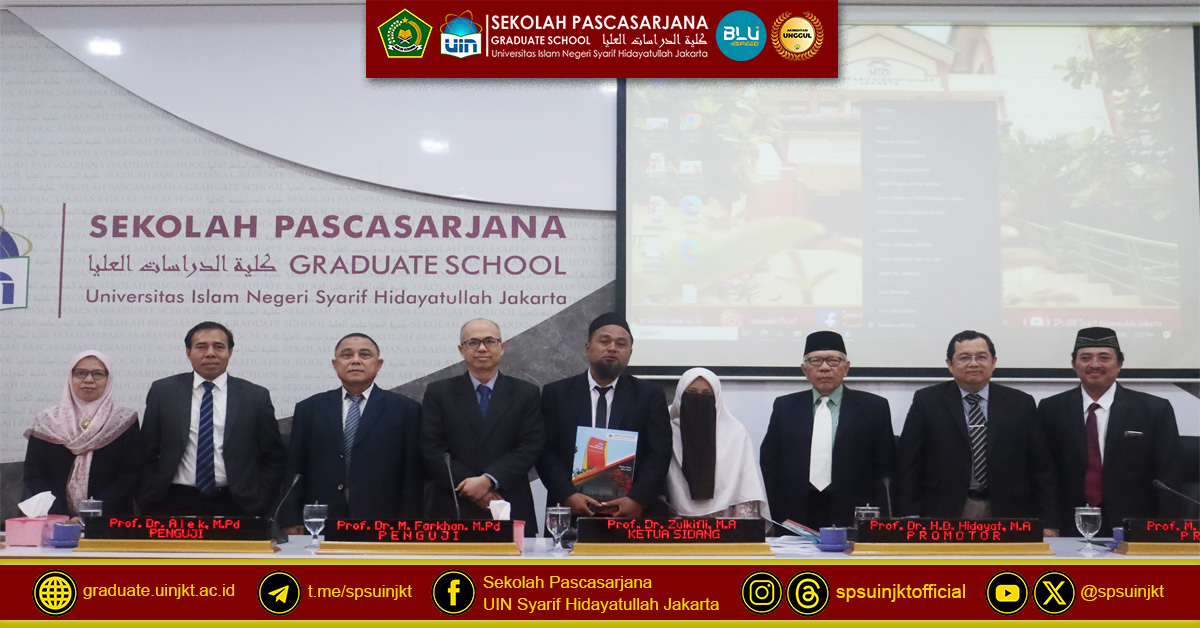Doctoral Promotion Exam Zulham Afandi, Naẓarīyah al-Waḥdah on Mahārat al-Kalām Learning
Auditorium of Prof. Dr. Suwito, MA SPs UIN Jakarta, SPs NEWS: The Graduate School of Syarif Hidayatullah State Islamic University Jakarta held the 1636th Doctoral Promotion Exam in the Auditorium Room of Prof. Dr. Suwito, MA SPs UIN Jakarta, on Wednesday, July 30, 2025 with promovendus Zulham Afandi.
Zulham Afandi is a student of the doctoral study program in Islamic Studies with a concentration in Arabic Language Education. Zulham wrote a dissertation entitled "Naẓarīyah al-Waḥdah on the Learning of Mahārat al-Kalām at the Darul Hikmah Islamic Boarding School, Asahan Regency"
Learning Arabic, especially in improving speaking skills (maharatul kalam), has always been a concern in many Islamic boarding schools. Answering this question, Afandi proposes the Naẓarīyah al-Waḥdah approach, a learning method that emphasizes the comprehensive integration of various aspects of language skills in a relevant and functional context.
This qualitative research with an exploratory case study approach examines in depth the concept of Naẓarīyah al-Waḥdah, explores its development strategy, and analyzes its implementation at the Darul Hikmah Islamic Boarding School. Through observation, in-depth interviews, and documentation, Zulham managed to map how this method can improve the learning outcomes of maharatul kalam students.
The results of Zulham's study show that Naẓarīyah al-Waḥdah prioritizes a holistic approach, combining speaking, listening, reading, and writing skills into a mutually supportive unit. Its development strategy includes designing a curriculum based on active communication, the use of interactive learning media, and the creation of a conducive language environment.
The implementation of this strategy at the Darul Hikmah Islamic Boarding School has proven to have a significant positive impact. The increase in active participation of students in daily discussions and conversations, as well as better mastery of vocabulary and language structure, is clear evidence of the effectiveness of this approach. This study recommends strengthening training for teachers, improving technology-based learning facilities, and periodic evaluations to ensure the sustainability of these methods.
In the academic realm, this dissertation sparked an interesting debate. Zulham highlighted the lack of systematic integration between functional communication-based learning and the pesantren environment in previous studies, such as those conducted by Mahmud Yunus and Zarkasyi Ahmad, which tend to emphasize traditional methods without comprehensive integration with modern approaches.
On the other hand, this research is in line with the views of figures such as Hosni Al-Mekhlafi and R. Jack Richards who advocate context-based integrative approaches and actual communication in foreign language learning. This debate underscores the difference of views between those who support Naẓarīyah al-Waḥdah as a methodological reform, and traditionalists who fear that this approach could undermine the authenticity of Islamic boarding school turats. Thus, Naẓarīyah al-Waḥdah has great potential to be an innovative solution to improve the quality of Arabic language learning in Islamic boarding schools.
Zulham Afandi successfully defended his dissertation under the guidance of Prof. Dr. H.D. Hidayat, MA and Prof. Muhammad Zuhdi, M.Ed, Ph.D, and was tested in front of a board of examiners consisting of Prof. Dr. Zulkifli, MA, Prof. Dr. H.D. Hidayat, MA, Prof. Muhammad Zuhdi, M.Ed, Ph.D, Prof. Dr. Muhammad Farkhan, M.Pd, Prof. Dr. Alek, M.Pd and Dr. Maswani, MA.
After paying attention to the dissertation writing, the comments of the examiner team and the answers of the promovendus, the examiner team determined that Zulham Afandi graduated with the title of Very Satisfactory. Zulham Afandi is the 1636th Doctor in the field of Islamic Studies, in the doctoral program of the Graduate School of UIN Syarif Hidayatullah Jakarta. (JA)

